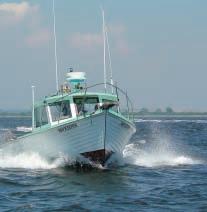{{ Ripples }}}}}} Santa Barbara Channelkeeper
Reducing the Overload
The measure will reduce excess water flowing into the system and prevent sewage overflows during storms.
F
or years, Santa Barbara Channelkeeper has been lobbying city officials to implement meaningful and proactive measures to deal with Santa Barbara’s sewage problems. In 2005 alone, 30 sewage spills swept through Santa Barbara’s coastal corridor. But this September Channelkeeper was successful in urging city officials to enact legislation to fix Santa Barbara’s faulty sewer pipes. When in disrepair, sewer laterals, or pipes that carry wastewater from buildings to public sewer mains, allow excess water into the city sewage system. City officials estimate that up to 80 percent of laterals
The waste pile at the NY Susquehanna & Western Railroad site must now be cleaned up.
Santa Barbara Passes Sewage Ordinance in Santa Barbara are defective. In response to Channelkeeper’s advocacy, the Santa Barbara City Council passed an ordinance that will require property owners to have laterals inspected by a licensed plumber and repair all defects. The measure will reduce excess water flowing into the system and prevent sewage overflows during storms. The city council also addressed storage capacity problems that result in frequent sewage spills on Santa Barbara’s East Side. Two new sewer pipes are being added to relieve the pressure of flows through pipes that overload and cause overflows during storms.
Railroads Not Above the Law Riverkeeper, Baykeeper prevail against NY Susquehanna & Western Railroad
T Hackensack Riverkeeper
his September, a U.S. District Court Judge ruled in favor of Hackensack Riverkeeper and NY/NJ Baykeeper who sought to stop the New York Susquehanna and Western Railroad Corporation from spilling solid waste into the Hackensack River watershed. The judge’s decision affirmed that the company’s garbage dumps in North Bergen, NJ, must comply with federal environmental laws. The railroad, a subsidiary of the New York-based Delaware Ostego Corporation, owns and operates five separate garbage dumps in the Hudson County municipality. Construction debris unloaded from trucks, including radioactive soils, is stored on the ground in large uncovered piles. Runoff from the piles, drifting dust and litter contaminate the surrounding Meadowlands, neighborhoods and the Hackensack River. The judge rejected the railroad’s claim that they are exempt from federal environmental law. “This decision confirms that the loophole allowing railroads to pollute with impunity does not exist, and they have to follow the rules along with everyone else,” says NY/NJ Baykeeper Andrew Willner.
12
Waterkeeper Magazine Winter 2007
www.waterkeeper.org










